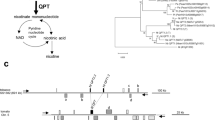Abstract.
The enzyme 3-hydroxy-3-methylglutaryl coenzyme A reductase (HMGR, EC 1.1.1.34) is encoded by a small multigene family in tomato (Lycopersiconesculentum Mill.) and catalyzes the synthesis of mevalonic acid (MVA), a committed step in the biosynthesis of sterols and isoprenoids. A chimeric HMG1::GUS reporter gene fusion was used to analyze the regulation of HMG1 gene expression in detail. HMG1 promoter 5′ deletion mutants established the boundary of a fully inducible promoter. In HMG1::GUS transgenic tomato plants, histochemical staining with 5-bromo-3-indolyl-glucuronide demonstrated that HMG1 was primarily expressed in shoot and root meristems, and in young tomato fruit. This result was confirmed by both HMG1 in-situ hybridization and RNA gel blot analysis. Tomato suspension cell experiments showed that steady-state HMG1 mRNA accumulated during lag and exponential growth phases, but not during the stationary phase. Transient expression of the HMG1::GUS in tissue culture cells treated with mevinolin indicated that HMG1 expression was subject to feedback regulation by a biosynthetic product derived from MVA. These results suggest that a primary, although not exclusive, role of HMG1 is to supply the MVA demand associated with cell division and growth.
Similar content being viewed by others
Author information
Authors and Affiliations
Additional information
Received: 26 October 1998 / Accepted: 16 December 1998
Rights and permissions
About this article
Cite this article
Jelesko, J., Jenkins, S., Rodríguez-Concepción, M. et al. Regulation of tomato HMG1 during cell proliferation and growth. Planta 208, 310–318 (1999). https://doi.org/10.1007/s004250050564
Issue Date:
DOI: https://doi.org/10.1007/s004250050564




